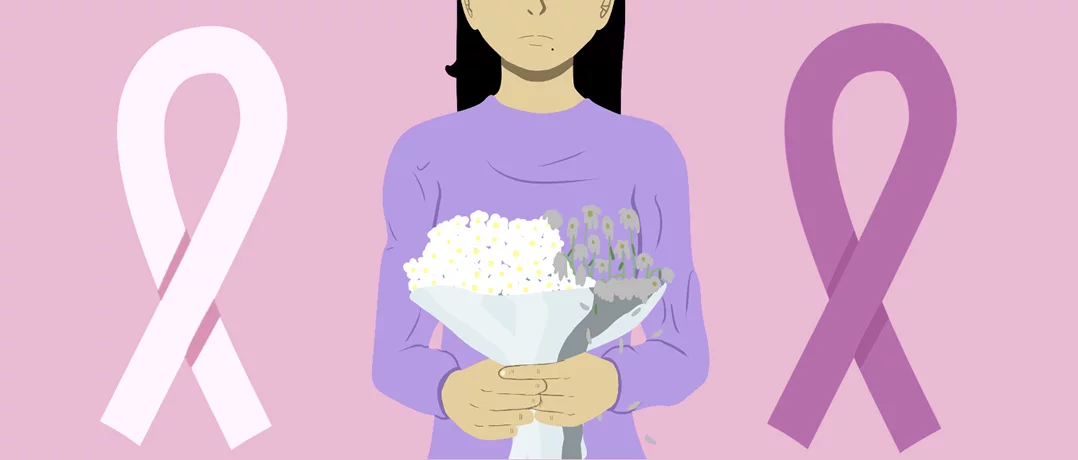Helen’s breast cancer journey highlights the power of early detection, resilience, and speaking out to support others.
Beyond the battle, embracing life

Strong, pragmatic, and positive. Helen is all of that.
She was 48 when she was diagnosed with breast cancer. The same age her maternal aunt had been when she faced the disease.
“I was having my routine check-up, which I used to do twice a year since I was 35, because I’ve had cystic breasts,” she recalled. “That day, my radiologist wasn’t as reassuring as usual. She told me I needed a biopsy and suggested to talk to my gynecologist first. She also showed me the results of both my mammogram and ultrasound. On the screen, I remember seeing what looks like a constellation of stars. The screen was glowing,” Helen added with a nervous laugh.
A week later, she had her biopsy but didn’t wait for the results. She travelled to visit her son who was studying abroad. She is the mother of two grown-up sons.
“When I got back to Lebanon, I went straight to the laboratory. They told me the results had been sent to my doctor,” Helen recounted.
I understood the biopsy hadn’t come back clean. But I wasn’t surprised.
She waited three hours at her gynecologist’s clinic. He was delivering a baby. When he finally saw her, he confirmed what she already knew and referred her to a surgeon and an oncologist.
The surgeon suggested a mastectomy on her right breast. But Helen insisted on having both breasts removed. “It didn’t make sense to have a natural breast and a fake one,” she said. “And I wanted to eliminate any further risk.”
And she was right. The pathology report showed that the left breast had been at a pre-cancerous stage.
At the plastic surgeon’s clinic, Helen stayed more than two hours discussing every step of the procedure. “He told me I would have a constant feeling of pressure and discomfort once the implants were in, she noted. Six years later, I still feel it.”
She didn’t go through chemotherapy and radiotherapy.
The sentinel nodes were clean, she said. I was fortunate. We caught it early.
In God’s hands
Helen held onto that mindset throughout her treatment. “When I got the diagnosis, I told myself I’d have the surgery and leave the rest in God’s hands,” she added.
The days following the surgery were painful. So was the month she spent preparing for the implant surgery. “But I felt… nothing,” she admitted. “Was it denial? I don’t know. All I was thinking of was how lucky I was. In every way. Lucky to be well surrounded. Lucky to have private insurance. Lucky to afford the second mastectomy. Lucky to have good doctors. Lucky not to go through chemotherapy. Lucky to still be here for my sons.”
“I wasn’t even affected by my body image,” Helen confided. “Clearly, it’s not what you would call beautiful. Till now, these breasts don’t feel like a part of me. But I focus on the positive. I don’t have to wear a bra all the time, and I can wear clothes I couldn’t before.”
Helen recalled the only time she had a breakdown was while having a tattoo to recreate her nipples:
The lady doing it was so kind and considerate that I couldn’t help but cry.
On shaky ground
The illness took a heavy toll on Helen’s marriage. “My couple was already on shaky ground,” she noted. A year after my diagnosis, he met another woman. He fell in love. We separated. Was it because of my cancer? Or because we had been married for 22 years? I think it was a bit of both.”
Helen speaks freely about her cancer. “You can’t imagine how many women I’ve spoken to, most of them complete strangers,” she said. “They were looking for information and reassurance. I think I’ve helped quite a few. I would have loved to receive that kind of support myself. The research I did helped me. That’s why I asked for a double mastectomy. But many women, even educated ones, don’t know much about breast cancer. It’s sad. Others don’t talk about it. Just like my close friend. She was diagnosed around the same period as me, but waited six months before telling me. I know every woman deals with breast cancer in her own way. But I believe it is important to talk about it. It helps others. And after all, there is nothing to be ashamed of.”
What did she learn? “There’s nothing you can’t handle if you put your mind to it,” she stated.
Life is short. We must live every moment fully. Cancer changed my perspective in so many ways.
To all women newly diagnosed with breast cancer, Helen wants to offer reassurance: “It is going to be OK. It’ll be long and hard, but in the end, it will be OK. Just take it one day at a time.”
And to those still hesitant to get screened, she is clear: “It is a must. If you won’t do it for yourself, do it for your family. Don’t overthink it. The sooner you catch it, the higher your chances of beating it.”


